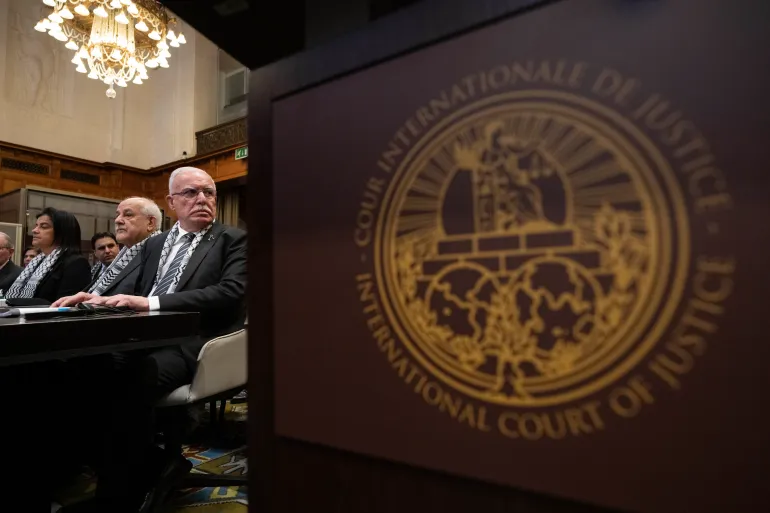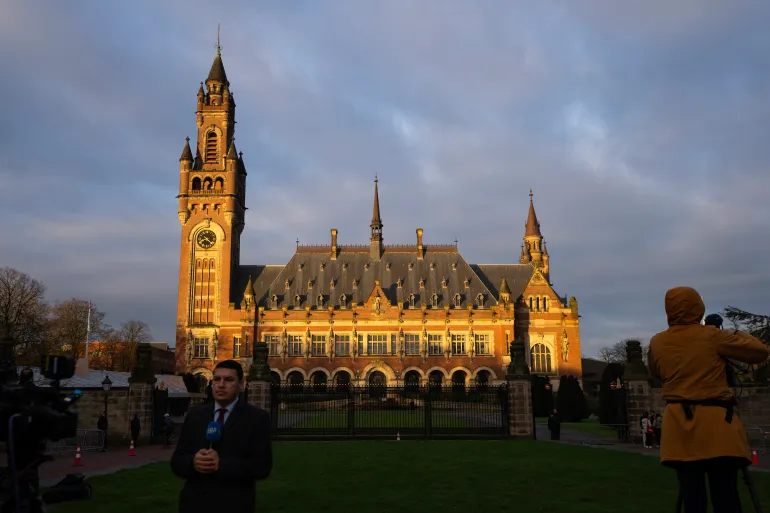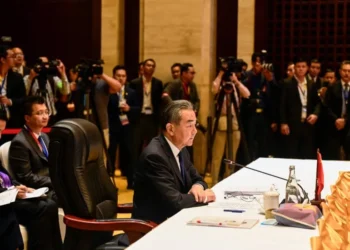The International Court of Justice (ICJ) has commenced hearings into the legality of Israel’s 57-year occupation of the Palestinian territories.
The case is separate from the genocide complaint South Africa filed at the ICJ against Israel for its alleged violations in the ongoing war.
It focuses instead on Israel’s occupation of the West Bank, Gaza and East Jerusalem since 1967.
The case arrived at the court after the UN General Assembly (UNGA) voted by a wide margin in December 2022 to ask the 15-judge panel for a non-binding advisory opinion on the Israeli occupation.
The UNGA asked the court for an advisory opinion on the legal consequences of Israel’s “occupation, settlement and annexation … including measures aimed at altering the demographic composition, character and status of the Holy City of Jerusalem, and from its adoption of related discriminatory legislation and measures.”
The UN resolution also asked the ICJ to advise on how those policies and practices “affect the legal status of the occupation” and what legal consequences arise for all countries and the UN from this status.
The case marks the second time the UNGA has asked the ICJ for an advisory opinion related to the occupied Palestinian territory.
In July 2004, the court found that Israel’s separation wall in the West Bank violated international law and should be dismantled, though it still stands to this day.
The hearings will be held until February 26, after which the judges are expected to take several months to deliberate before issuing an advisory opinion.
The six-day public hearing will allow parties to give their views on the legal consequences of Israel’s occupation of the Palestinian territories.
Palestinian representatives are slated to speak first on Monday, February 19, 2024.

It was said that they will argue that the Israeli occupation is illegal because it has violated three key tenets of international law.
After the Palestinians present their arguments, an unprecedented 51 countries and three organisations – the League of Arab States, the Organization of Islamic Cooperation and the African Union – will address the judges.
On February 20, 2024, South Africa, Algeria, Saudi Arabia, the Netherlands, Bangladesh, Belgium, Belize, Bolivia, Brazil, Canada and Chile will make their presentations.
Colombia, Comoros, Cuba, Egypt, United Arab Emirates, United States, Russia, France, The Gambia, Guyana, Hungary will present their cases on the next day, February 21, 2024.
February 22, 2024, will see arguments from China, Iran, Iraq, Ireland, Japan, Jordan, Kuwait, Lebanon, Libya, Luxembourg, Malaysia and Mauritius.
On February 23, 2024, the court will hear Namibia, Norway, Oman, Pakistan, Indonesia, Qatar, United Kingdom, Slovenia, Sudan, Switzerland, Syria and Tunisia’s arguments.
Finally, Turkey, Zambia, Arab League, Organisation of Islamic Cooperation, African Union, Spain, Fiji and Maldives will present their cases on February 26, 2024.
Israel will not present an oral argument, although it has sent written observations.
According to the ICJ, the outcome of the advisory opinion would not be legally binding but would carry “great legal weight and moral authority.”
Hearing Deemed Extremely Important
Palestinian lawyer Muhammed Dahleh labelled Monday’s hearing as extremely important.
He said that Palestinians have been trying for decades to use international law and international diplomacy to bring attention to their cause, noting that “all these mechanisms did not really help them in changing the reality on the ground.”
“This addition now of the advisory opinion by the International Court of Justice might mean that actually many countries in the world will have a legal basis to deal with the Israeli occupation and maybe even the Israeli state and the Israeli government in a different way,” he said.
Since 1967, Israel has greatly expanded Jewish settlements in the West Bank, which Palestinians say compromises the creation of a viable Palestinian state.
It has also annexed East Jerusalem in a move not recognised by most countries.
READ ALSO: Navalny’s Demise: Are Investigations Needed Or Villian Already Exposed?





















